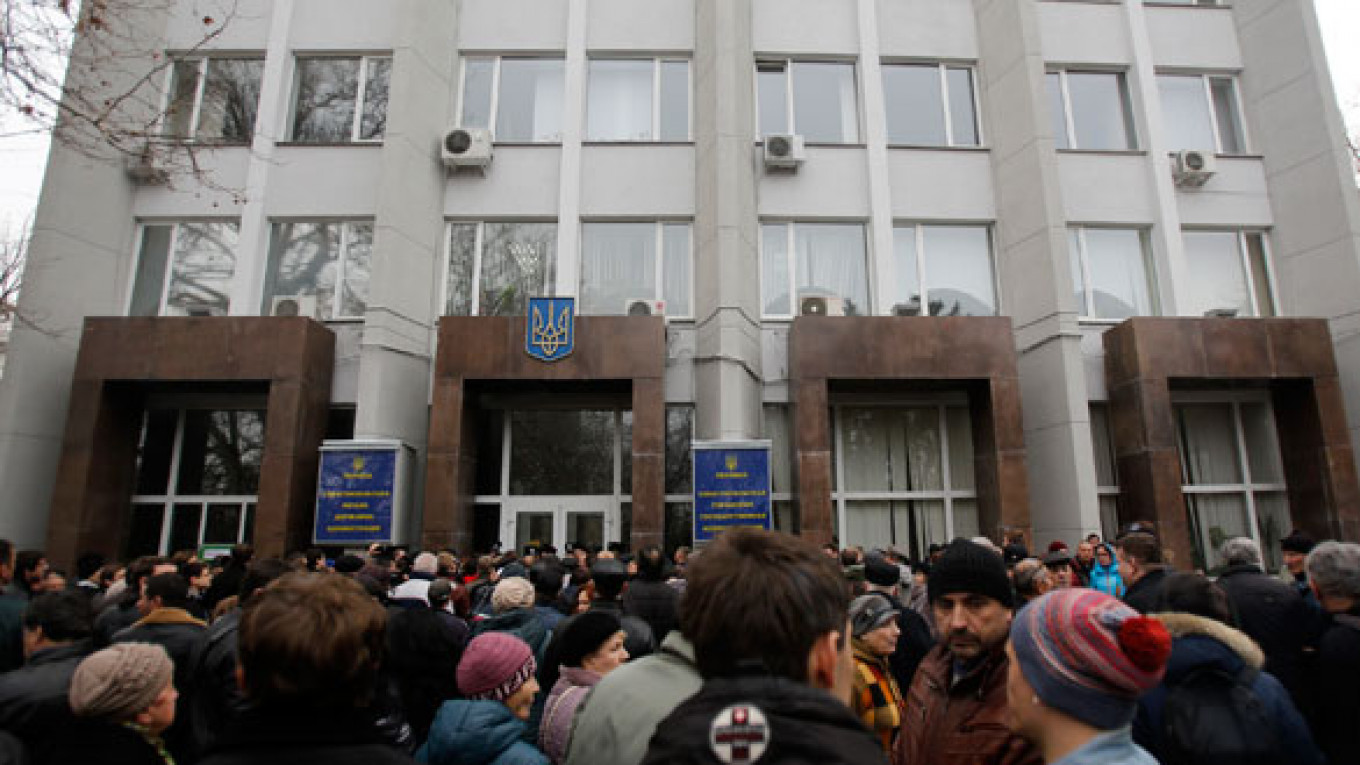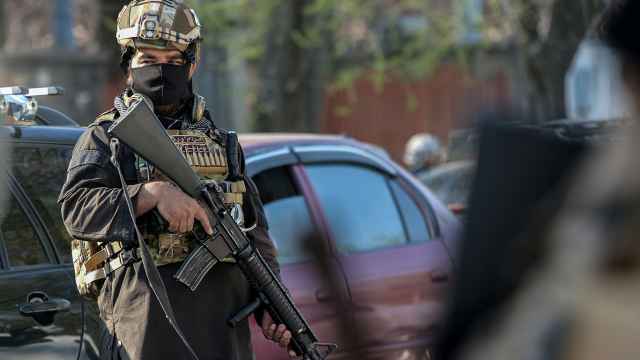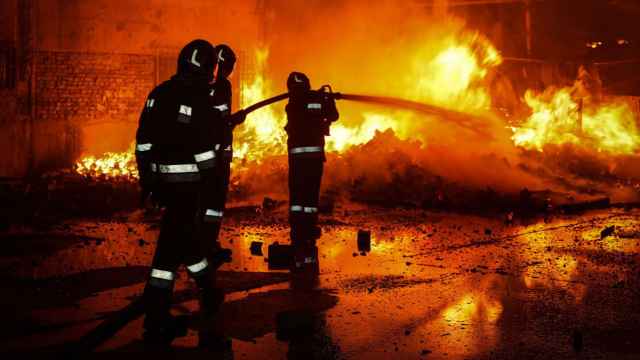Russia on Monday harshly denounced the political uprising in neighboring Ukraine, ominously predicting that "dictatorial and at times terrorist" methods would be used to repress minorities under the new regime, a view strongly contrasting with the restrained optimism of the European Union and the U.S. regarding the regime change in Kiev.
Even as the EU officially recognized the appointment of a temporary replacement for ousted President Viktor Yanukovych by Ukraine's parliament, and the U.S. welcomed what it called "constructive work" by Kiev lawmakers, Moscow cast doubt on the legitimacy of the new government and depicted a country overrun by armed extremists.
"In Russia we are extremely concerned about the development of the situation in Ukraine," the Foreign Ministry said in a statement Monday evening. "In recent days, in the capital and a number of other cities there have been armed clashes between violent roughnecks and militants from far-right nationalist organizations with security forces who were defending the safety of the peaceful population and the interests of the government."
"We strongly call on all parties to the Ukraine crisis to exhibit maximum accountability and not to allow a further degradation of the situation, return it to the legal domain and rigorously suppress the extremists who have raised their fists against the authorities."
The explosive situation described by the Foreign Ministry contrasted with many accounts of events across Ukraine in various media reports, although tensions have arisen in the largely Russian-speaking areas in the country's east and south, where there is far less support for the Euromaidan protest movement that pushed Yanukovych to flee Kiev over the weekend.
Clashes in Kiev last week between police and protesters led to at least 82 deaths, but no such deadly violence has been reported anywhere in the country since Yanukovych and officials in his government left the capital.
The contrast between the Russian statement and the more positive outlook of European and U.S. officials underlined the East-West divide over the events in Ukraine, a country of 46 million people that is traditionally split in its political allegiances between the west, which feels closer to Europe, and the east, where ties to Russia are strong.
Russia's Foreign Ministry accused unnamed Western countries of being more concerned about "one-sided geopolitical calculations" in their actions than about the fate of Ukraine, urging them to pass judgment on the "criminal actions of extremists," which it said included neo-Nazi and anti-Semitic elements. It said the priority should be to return to an agreement signed by the German, French and Polish foreign ministers on Feb. 21 that envisioned constitutional reforms.
In Sochi, Prime Minister Dmitry Medvedev cast doubt on the legitimacy of the new Kiev government in comments to reporters, saying there was "no one there to talk to," Interfax reported.
But EU foreign policy chief Catherine Ashton traveled to Kiev on Monday evening to meet with the new authorities to discuss a path out of the political crisis and much-needed economic aid for Ukraine. U.S. Deputy Secretary of State William Burns will go to the Ukrainian capital later this week, to "consult with key Ukrainian leaders, the business community, and civil society on U.S. support for Ukraine's efforts to secure a stable, democratic, inclusive, prosperous future," the U.S. State Department said in a statement.
Russian Interference?
As Russian politicians condemned the events in Kiev as an illegitimate coup, speculation grew amid Ukrainian politicians that the country's Russian-speaking eastern regions could secede and come into the Kremlin's orbit and that a Russian military invasion was a possibility.
Euromaidan protest leaders have alleged that the Kremlin had already participated in Ukraine's internal affairs by sending snipers and police officers to support Yanukovych's regime. But little evidence has been presented to back up such claims, and Russian analysts and policy makers dismissed talk of a Kremlin-organized invasion or the secession of eastern Ukrainian regions as unrealistic.
United Russia lawmaker Vyacheslav Nikonov, a deputy chairman of the State Duma's International Affairs Committee, said by phone that he saw no grounds for separating Ukraine's eastern regions from the country and ruled out the possibility of sending Russian troops across the border.
He said that after a new "revolutionary" government was formed, it would become clearer whether Russia would be able to cooperate with the new authorities.
Ukraine's parliament was taken over the opposition in recent days and Yanukovych was officially impeached, with parliament speaker Oleksander Turchinov appointed stand-in president. The parliament also passed constitutional amendments restricting the president's powers and announced that early presidential and legislative elections would be held later this year.
Leonid Kalashnikov of the Communist Party, another deputy chairman of the Duma's International Affairs Committee, said "only idiots" could talk of Russian military involvement in Ukraine. But he said Russia should take action in Ukraine through economic and other tools.
According to Stanislav Belkovsky, head of Russia's National Strategy Institute think tank, eastern regions cannot secede since "no one wants to come under the influence of Putin's Russia."
But Putin might try to interfere in Ukraine by allying with former Prime Minister Yulia Tymoshenko, who was released from prison over the weekend, Belkovsky said, adding that this policy was bound to fail because the Ukrainian people would not accept it.
The Kremlin seems to be still considering its next move, having recalled its ambassador Mikhail Zurabov from Kiev "for consultations" on Sunday, citing "the aggravation of the situation in Ukraine and the necessity of thoroughly analyzing it."
Oleh Tyahnybok, head of Ukraine's nationalist Svoboda party, accused Russia on Monday of amassing troops near its southeastern border. Ukraine's border patrol said that it had no such information but that it was strengthening its defenses.
In the Russian-speaking autonomous republic of Crimea, where Russia has naval facilities, anti-Euromaidan sentiment ran high as local residents repeatedly appealed to the Kremlin for support. In many areas of Crimea, self-defense units were formed to prevent the seizure of government buildings by Euromaidan demonstrators.
In the city of Sevastopol, the main Russian naval base in Crimea, thousands of protesters rallied with Russian flags on Sunday and elected a pro-Kremlin mayor. Previously, the city had no elected mayor, and its head was appointed by the central government.
The protesters also pledged not to pay taxes to the national government and to subjugate local police to City Hall. Meanwhile, Yury Lutsenko, a leader of the Euromaidan movement, said that Russian armored vehicles had been deployed at roads leading to Sevastopol.
In Kerch, another major city in Crimea, pro-Russia protesters pulled down a Ukrainian flag on the city's central square and hoisted a Russian one on Sunday.
Kharkiv, another major center of eastern Ukraine, hosted a congress of the pro-Russian Ukrainian Front on Saturday in what was seen by many as an effort to separate Russian-speaking regions from Ukraine. Its participants criticized the new national government and proclaimed solidarity with the country's northern neighbor, shouting "Russia!"
However, the leaders of the Ukrainian Front, Kharkiv Mayor Gennady Kernes and Kharkiv region Governor Mikhail Dobkin dismissed speculation that the country's eastern regions could secede, saying that they were in favor of Ukraine's territorial integrity.
Concerns over Kharkiv becoming a separatist center subsided when an unprecedented number of Euromaidan supporters rallied in the city and seized the regional administration's building on Saturday.
Another controversy that aggravated relations between Russia and Ukraine was the passage of a law on Sunday that deprived Russian of the status of a regional language, reversing Yanukovych's pro-Russian language legislation.
Russia's human rights ombudsman Vladimir Lukin and Ilyas Umakhanov, a deputy speaker of the Federation Council, on Monday criticized the new Ukrainian authorities' language policy, saying it would alienate the country's eastern regions.
Contact the author at o.sukhov@imedia.ru
A Message from The Moscow Times:
Dear readers,
We are facing unprecedented challenges. Russia's Prosecutor General's Office has designated The Moscow Times as an "undesirable" organization, criminalizing our work and putting our staff at risk of prosecution. This follows our earlier unjust labeling as a "foreign agent."
These actions are direct attempts to silence independent journalism in Russia. The authorities claim our work "discredits the decisions of the Russian leadership." We see things differently: we strive to provide accurate, unbiased reporting on Russia.
We, the journalists of The Moscow Times, refuse to be silenced. But to continue our work, we need your help.
Your support, no matter how small, makes a world of difference. If you can, please support us monthly starting from just $2. It's quick to set up, and every contribution makes a significant impact.
By supporting The Moscow Times, you're defending open, independent journalism in the face of repression. Thank you for standing with us.
Remind me later.






